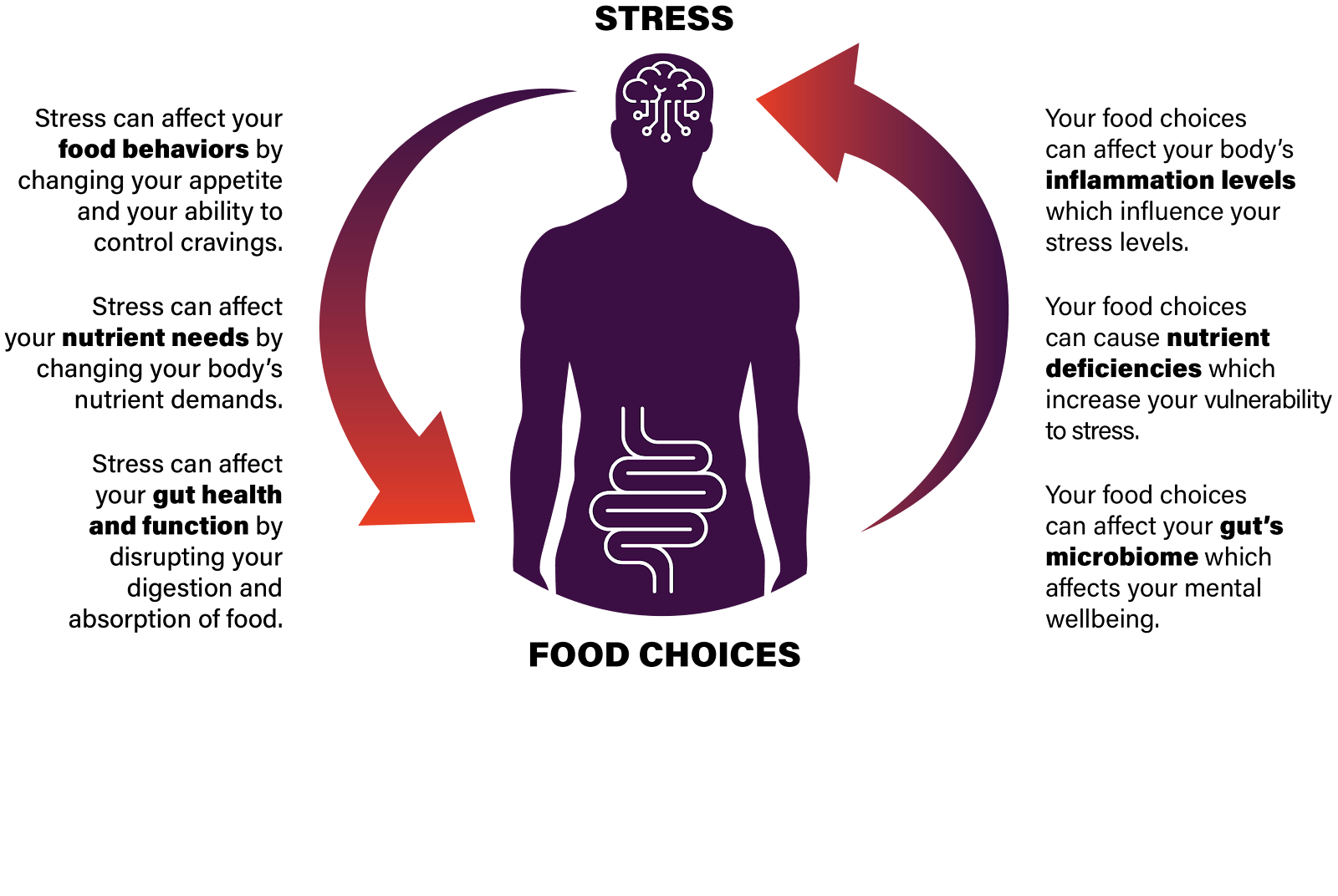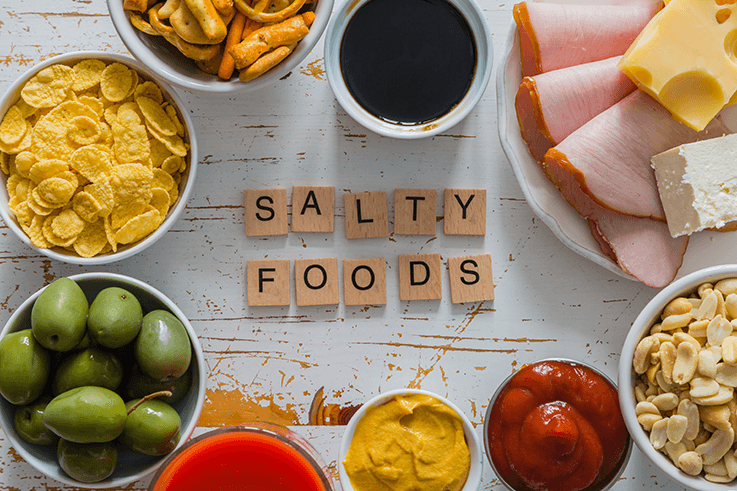While many of us reach for “comfort foods” during tough times, you might be surprised to learn that some of these choices can actually make stress worse. Certain foods can trigger inflammation and spike cortisol, your body’s main stress hormone. It’s a frustrating cycle: you feel stressed, you eat something you think will help, but you end up feeling even more anxious and out of sorts.
Foods high in added sugars, caffeine, processed ingredients, and unhealthy fats don’t just fail to provide relief—they can actively fire up your body’s stress response. Understanding which foods cause stress and why they affect you can empower you to make better dietary choices that genuinely support your mental well-being.
How Food Affects Your Stress Levels
The connection between your plate and your peace of mind is stronger than you might think. Your body has a sophisticated stress response system (often called the “fight-or-flight” response) that’s designed to handle immediate threats. The problem is, certain foods can trigger this system even when there’s no real danger. This is where the gut-brain axis, inflammation, and blood sugar come into play.

When you eat foods that your body struggles to process, it can lead to systemic inflammation. This is often measured by markers like C-reactive protein. This inflammation isn’t just physical; it sends signals to your brain that can heighten feelings of anxiety and low mood.
At the same time, many stress-inducing foods send your blood sugar on a rollercoaster. A sudden spike in blood sugar signals your body to release insulin to manage it. When your sugar levels then crash, your body releases cortisol to compensate. This constant up-and-down messes with your energy and mood, leaving you feeling irritable and stressed. Becoming more aware of these connections is a core part of mindful eating, which helps you understand how food truly impacts your body and mind.
Added Sugars and Sweet Foods
That sweet treat might offer a momentary escape, but the aftermath can be rough. Foods packed with added sugars—like candy, pastries, sugary sodas, and desserts—cause a rapid spike in blood sugar. Your body scrambles to bring it down, leading to the inevitable “crash” that can leave you feeling irritable, anxious, and foggy.
This cycle puts your body in a state of physiological stress. Over time, a high-sugar diet can also increase inflammation in the brain, which studies have linked to symptoms of depression.
Be mindful of hidden sugars in everyday items like breakfast cereals, flavored yogurts, sauces, and salad dressings. The Dietary Guidelines for Americans recommend limiting added sugars to less than 10% of your daily calories. Instead of starting your day with a sugary breakfast, consider choosing one of the best breakfast foods for energy to set a stable, positive tone.
Caffeine and Energy Drinks
Many of us rely on a morning coffee to get going, but too much caffeine can amplify your body’s stress response. As a stimulant, caffeine triggers the release of cortisol and adrenaline, the same hormones involved in the fight-or-flight response. If you’re already feeling stressed, this can push you over the edge into jitteriness and heightened anxiety.
It’s not just coffee, either. Caffeine lurks in many other products:
- Black and green teas
- Sodas and energy drinks
- Chocolate
- Pre-workout supplements
Caffeine can also disrupt your sleep, and a lack of quality rest is one of the biggest contributors to high stress levels. If you notice you’re feeling anxious, try cutting back on caffeine and see how your body responds.
Alcohol and Alcoholic Beverages
It’s a common belief that a glass of wine or a beer can help you unwind. While it might feel relaxing in the moment, alcohol actually increases cortisol levels and interferes with your body’s ability to manage stress.
Chronic alcohol use can alter your brain chemistry, making you more prone to anxiety. It also severely disrupts your sleep cycle. Even if you fall asleep easily after drinking, alcohol interferes with restorative REM sleep, meaning you’ll likely wake up feeling tired and on edge. This sleep deprivation further elevates stress, creating a vicious cycle.

Processed and Refined Carbohydrates
Refined carbohydrates—like white bread, white rice, pasta, and most packaged snacks—have been stripped of their fiber and nutrients. Because of this, they behave a lot like sugar in your body, causing rapid blood sugar spikes that can lead to mood swings and irritability.
This category often overlaps with highly processed foods, which contain preservatives and additives that can disrupt your gut microbiome. A healthy gut is essential for producing neurotransmitters like serotonin that regulate mood.
White Bread and Pasta
These staples are considered “empty calories” because they offer little nutritional value. Their lack of fiber means they are digested quickly, leading to that familiar blood sugar spike and crash. For more stable energy and a better mood, try switching to whole-grain alternatives like brown rice, quinoa, whole-wheat bread, and whole-grain pasta.
Processed Meats
Foods like sausages, bacon, deli meats, and hot dogs are packed with preservatives, high levels of sodium, and unhealthy fats. These ingredients can drive inflammation and negatively impact the delicate balance of bacteria in your gut, which is directly linked to your mental state.
Fried Foods and Trans Fats
Deep-fried foods are typically high in trans fats (often listed as partially hydrogenated oils on labels). These unhealthy fats are notoriously difficult for your body to process and are strongly linked to increased inflammation and a higher risk of depression.
When you eat these foods, your body has to work harder to break them down, which can be a source of physical stress. Common sources include:
- French fries
- Donuts and pastries
- Fried chicken
- Packaged cookies, crackers, and cakes
Instead, focus on healthy fats found in avocados, olive oil, nuts, and fish, which actually help reduce inflammation.
High-Sodium Foods and Salty Snacks
Ever feel bloated and sluggish after a salty meal? That’s because high-sodium foods cause your body to retain water, which can increase blood pressure. This physical strain contributes to your overall stress load.
Excessive salt intake can also disrupt your neurological system, affecting your body’s stress hormone response. While some sodium is essential, most of us consume far too much. The American Heart Association recommends no more than 2,300 milligrams per day. Watch out for high sodium in canned soups, frozen dinners, condiments, and deli meats.

Artificial Sweeteners
While they may be calorie-free, artificial sweeteners can cause their own set of problems. Research suggests they can lead to oxidative stress in the brain and disrupt the balance of your gut microbiome.
These fake sugars can also trick your body. Your brain thinks it’s getting sugar, which can mess with your insulin response and even increase cravings for real sweets later on. Avoiding them is a good step toward reducing systemic stress.
What to Eat Instead: Stress-Reducing Foods
The good news is that just as some foods cause stress, others can help you fight it. Shifting your focus to whole, nutrient-dense foods can make a world of difference. The right food can absolutely improve your mood and build resilience. The Mediterranean diet is an excellent model, emphasizing anti-inflammatory foods that support brain health and emotional balance.
Omega-3 Rich Foods
Omega-3 fatty acids are powerful antioxidants that protect the brain from stress-related damage. They help reduce inflammation and are crucial for cognitive function.
- Sources: Salmon, mackerel, sardines, walnuts, chia seeds, and flaxseeds.
High-Fiber Options
Fiber is essential for stabilizing blood sugar and feeding the beneficial bacteria in your gut. A healthy gut microbiome is key to a healthy brain.
- Sources: Berries, broccoli, avocados, lentils, black beans, quinoa, and oats.
Probiotic and Fermented Foods
These foods directly support your gut health by introducing beneficial bacteria. This strengthens the gut-brain axis, helping to regulate mood and lower stress.
- Sources: Yogurt (with live cultures), kefir, kimchi, sauerkraut, and kombucha.
Conclusion
Your diet is one of the most powerful tools you have for managing stress. By reducing your intake of sugar, caffeine, alcohol, and processed foods, you can lower inflammation and keep your blood sugar stable. At the same time, incorporating more whole foods rich in omega-3s, fiber, and probiotics can actively build your resilience to stress. It’s not about perfection, but about making small, mindful choices every day.
For more wellness insights, feel free to explore other articles on our site at www.notonetype.org.


Có thể bạn quan tâm
Healthy Eating on the Go: Simple Strategies for Busy Lifestyles
Maintaining nutritious eating habits while managing a hectic schedule can feel overwhelming, but healthy eating...
Dec
Healthy Snack Ideas for On the Go: Easy Portable Options for Busy Lifestyles
Finding nutritious snacks that travel well can transform your daily routine and help you maintain...
Dec
How to Build Sustainable Eating Habits: A Guide to Healthier Living and a Greener Planet
Sustainable eating habits involve choosing foods that support both personal health and environmental wellbeing. It’s about...
Dec
Healthy Grocery List: Complete Guide + Printable Template
Creating a healthy grocery list is one of the most effective first steps you can...
Dec
Healthy Grocery List for 2: Complete Guide to Smart Shopping and Meal Planning
Shopping for two people requires a strategic approach to avoid waste while maintaining a healthy...
Dec
How to Stock a Pantry: Your Complete Guide to Essential Kitchen Staples
A well-stocked pantry is the heart of a happy, efficient kitchen. It’s your secret weapon...
Dec